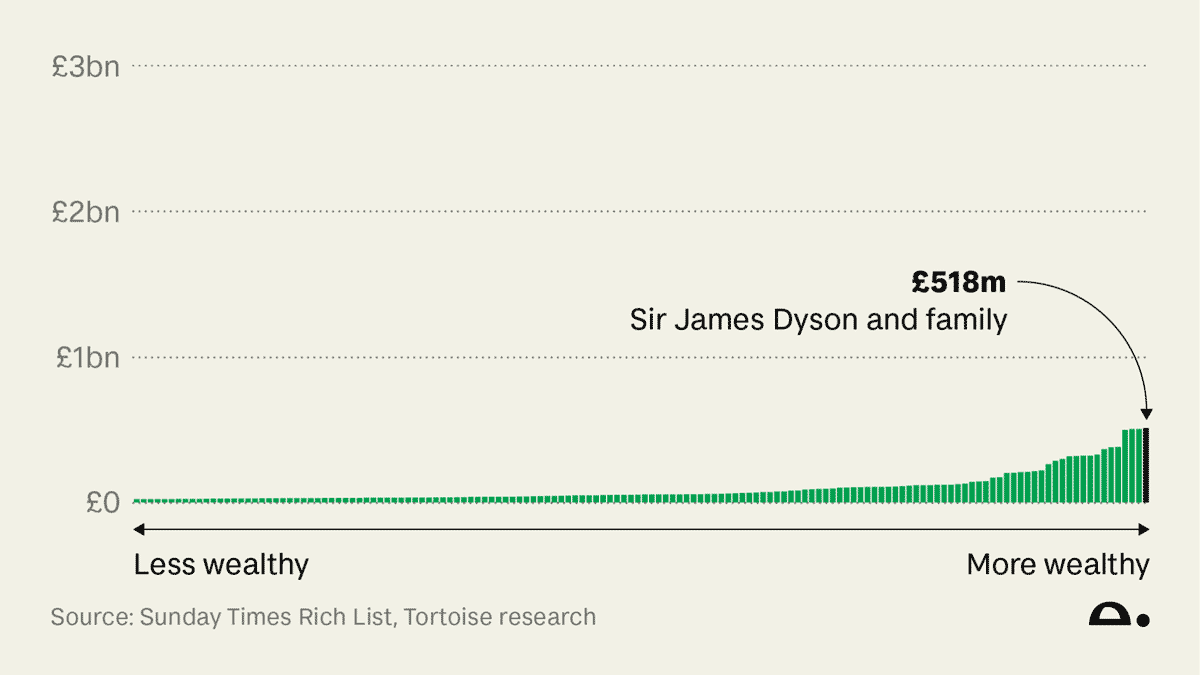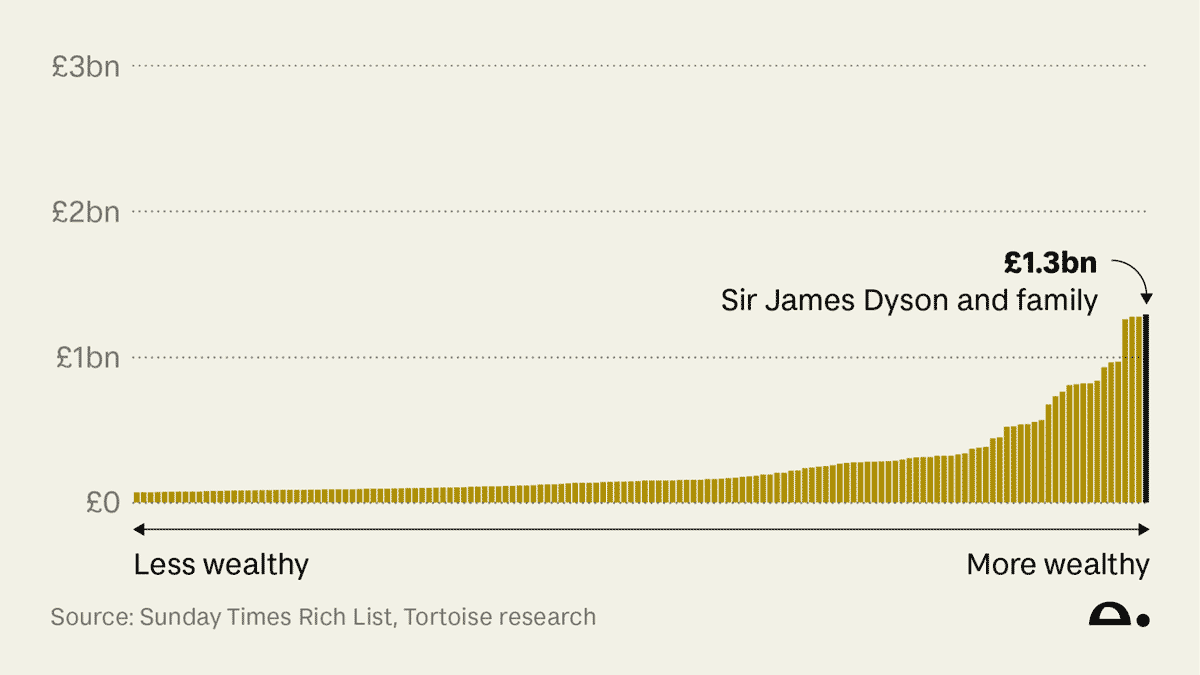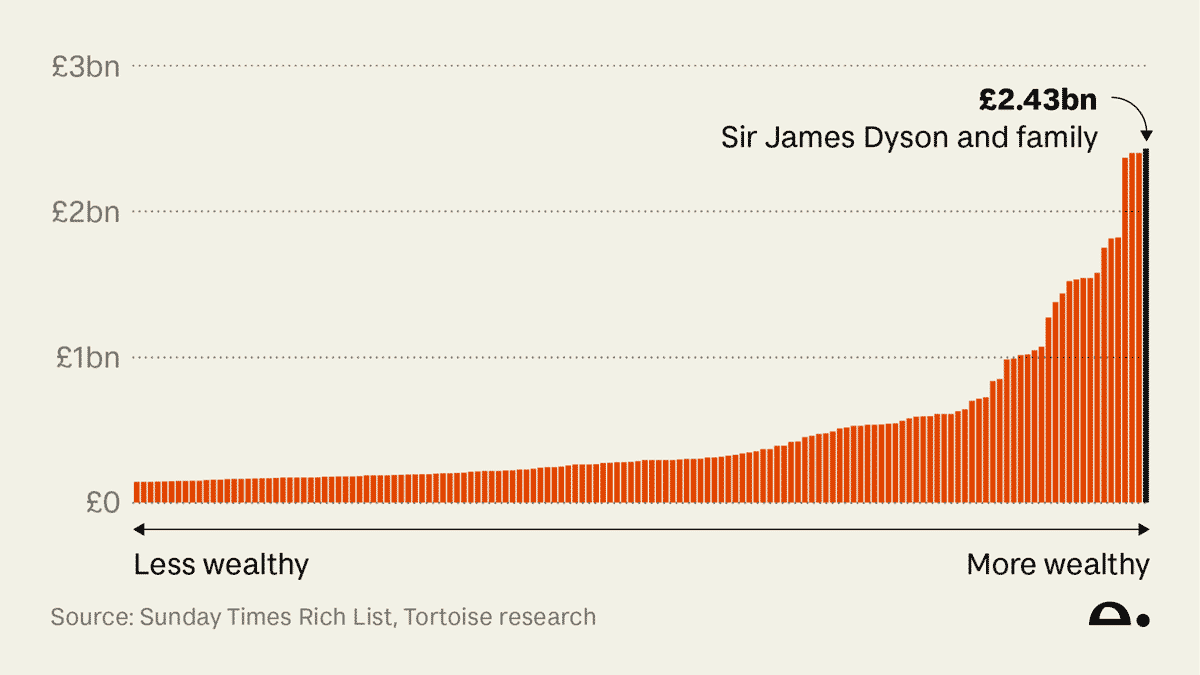A wealth tax could raise as much as £55bn – but is it really the answer?

Our friends at Tortoise are hosting an all-day summit on the Future of Money this coming Thursday. They’ve opened up the exclusive event to a small number of City A.M. readers, who can register here with the code GUESTOFCITYAM.
Here, Tortoise’s Kim Darrah and Giles Whittell look at what a mooted wealth tax could mean for the UK’s most prominent business figures…
The idea of taxing assets as opposed to income normally gets short shrift in the UK, but these aren’t normal times. Budget day is two weeks away and Rishi Sunak is looking at a Covid-19-shaped hole in the public finances.
Borrowing is up £350 billion year on year and the deficit has more than quadrupled.
Meanwhile the Chancellor may have noticed that one group of people have a lot more money now than before the pandemic – the billionaires.
Could they pay for Covid-19?
Why now?
The last British government that tried to introduce a tax on wealth was Harold Wilson’s in 1974, and it failed. But unlike his proposals, new ones from the Wealth Tax Commission, a group of independent academics, are for a one-off tax – and it would raise enough to cover the full range of coronavirus-related costs from furlough to industry bailouts.
The idea has some traction: an Ipsos poll in October found that, given of a choice of possible tax increases, more Britons chose a wealth tax than any other type of tax.
“It’s a way of raising money from those with the broadest shoulders, without needing to be a ‘soak the rich’ policy,” says Arun Advani, co-author of a recent commission report and a guest at Tortoise’s Future of Money summit next week.
Critics say wealth taxes tend to fail because the rich simply move their wealth abroad. But Switzerland’s experience suggests otherwise, and experts are taking the idea seriously again because of the sheer scale of the fiscal challenge.
What might it look like?
Key practical questions include how to value assets fairly and whether to include people’s homes. The commission’s proposals do include them and would impact millionaires as well as billionaires, but so far there has been little focus on exactly how much of the bill would be covered by the ultra-rich.
As an experiment, using wealth figures from the Sunday Times’ Rich List, we investigated what a wealth tax might look like for each of Britain’s billionaires under three of the options suggested by the commission. Each option is designed to raise the same amount of money in aggregate, but the bill for billionaires differs widely from one to the next.
For simplicity we’ve assumed that each individual, couple or family on the rich list will be taxed once. An estimated quarter of the wealth on the list is not held by UK tax residents, so we accounted for this by downgrading the revenue totals accordingly.
Here are the ground rules, tax takes and sample individual tax bills for each scenario:
- Option 1: For five years, all wealth above £250,000 is taxed at a flat rate of 0.64 per cent. Billionaires pay a total of £12bn.

Option 2: For five years, wealth between £500,000 and £10m is taxed progressively higher. All wealth beyond £10m is taxed at 1.6%. Under this plan, billionaires bring in a total of £29bn.

Option 3: For five years, wealth between £1m and £10m is taxed progressively higher. All wealth beyond £10m is taxed at 3%. Under this plan, billionaires bring in a total of £55bn.

Our findings suggest that, if the government were to opt for option 3, which falls most heavily on the super-rich, the 147 billionaires and billionaire families on the Sunday Times’ STRL could cover the entire £50 billion cost of furlough to date. Under this option, the billionaires would pay a combined total of £55bn, while the UK’s richest man, Sir James Dyson and his family, would be charged around £2.43bn.
While the Dyson family would face a bill in the billions, those at the bottom of the billionaire list, like Russian Entrepreneur Vladimir Makhlai and leisure entrepreneur Trevor Hemmings, would be charged from £30m to £150m (assuming they’re UK tax-residents).
Although simplified, the numbers give new clarity to the impact a wealth tax would have for the ultra-rich – and for the Exchequer. If introduced, it would probably have to come as a surprise. “If people had advanced notice, it’s more likely that they might try and get themselves or their wealth out of the country,” says Stuart Adam of the Institute of Fiscal Studies.
Progressives from France (Thomas Piketty) to Massachusetts (Elizabeth Warren) have seized on the pandemic as the moment to get serious about taxing wealth. Don’t expect Sunak to go for it next month, but don’t expect the idea to go away soon either.
“So is a wealth tax the answer? It’s appealing in theory, of course, but the ‘broadest shoulders’ already bear the brunt of our tax system. The top 1 per cent already pay 28 per cent of the UK’s income tax bill. It’s also the case that a ‘surprise’ tax wouldn’t do much for the UK’s long-earned reputation for a stable and predictable business environment.
“Far more radical would be for the Chancellor to take advantage of the Covid-19 crisis for a genuinely radical shake-up of the tax system that made Britain more competitive. Using low-interest rates now to stimulate growth that can pay to service the debt if those interest rates go up is the path I’d look for.”
Andy Silvester, Acting Editor City A.M.
Join a host of speakers at Tortoise’s Future of Money summit on Thursday. Register here and use the code GUESTOFCITYAM